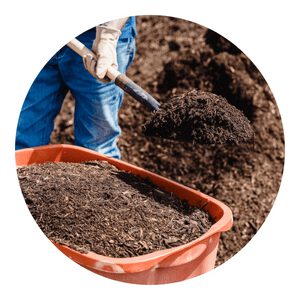Natural Fertilizers
As modern farming techniques continue to evolve, so too does the need for safe and effective fertilizers.
Natural fertilizers offer an alternative to chemically-based products, providing a more sustainable and healthier option for crop production.
Not only do they provide essential nutrients to plants, but they are also safer for the environment as they contain fewer chemicals than traditional fertilizers.
This article examines the benefits of natural fertilizers, exploring their impact on plant health and sustainability.
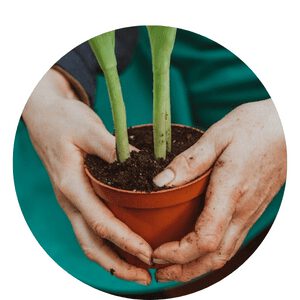
Organic Fertilizer
Organic fertilizers are becoming increasingly popular amongst gardeners and farmers alike.
Natural fertilizer is made from natural sources, such as animal manure, compost, and other plant-based materials.
This type of fertilizer is known to be beneficial for the environment because it does not contain any synthetic chemicals that can leach into water supplies or run off into rivers and streams.
Organic fertilizers also help build soil structure, improve water retention capacity in soils and increase nutrient content in crops.
Organic fertilizer has been used since ancient times to nourish crops naturally by adding essential nutrients for a healthy growing season.
Plants grown with organic fertilizers tend to be more resilient against disease, drought, and weed pressure than plants grown with synthetic fertilizers.
Natural Fertilizers Menu
Definition of natural fertilizers
Natural fertilizers are an important tool for ensuring that plants can grow to their fullest potential.
Natural fertilizers are substances derived from naturally occurring sources, such as animal waste, plant matter and minerals found in the soil or water.
This type of fertilizer provides essential nutrients like nitrogen, phosphorus and potassium to plants while also improving the overall structure of the soil.
When finding a natural fertilizer, it is important to consider its composition and how much time it takes to release its nutrients.
For example, manure is a popular natural fertilizer due to its high content of nitrogen and phosphorus but needs at least 30 days before it can be used on crops.
In comparison, green manures require minimal preparation but need more time in order to break down and release their nutrients into the soil.
Benefits of using natural fertilizers in the garden
The use of natural fertilizers in gardens is becoming increasingly popular for their numerous benefits.
Natural fertilizers are made from organic materials, providing essential nutrients such as nitrogen, phosphorus and potassium to plants in an environmentally friendly way.
Not only do these fertilizers promote healthier growth in plants, but they also have other advantages over chemical-based alternatives.
Natural fertilizer can help enrich soil quality by adding crucial microorganisms and beneficial bacteria into the soil structure that encourage nutrient uptake and promote vigorous root growth.
Additionally, natural fertilizers are less likely to cause burning or discoloration of delicate foliage due to their lower concentrations of salts and other minerals.
Applying natural fertilizer to your garden will not only help create a thriving environment for your plants, but it can also benefit the surrounding wildlife and local ecosystem too!
Rise up, all ye gardeners, and join with me in song For the day grows ever closer when we’ll bring forth a throng Of ripe and juicy fruits, freshly grown in soil Provided we but give our gardens natural toil. Let green earthworms be our tillers and birds our seeds abound To enrich the soil's riches so living things abound Compost, mulch, and manure come all from nature pure To coax our tiniest sprouts healthy out of the mire. Grow without harsh chemicals! A new age just awaits! Test results prove you're better protected from weeds or pests may rates Discover natural fertilizers that
Chappy The Gardener
Types of Natural Fertilizers
Types of Natural Fertilizers are a great way to nourish and enrich soil for optimal plant growth.
Many gardeners and farmers prefer using natural fertilizers as an alternative to chemical fertilizers, which can be harmful to plants and the environment.
Natural fertilizers come in many forms, from composts made from organic materials, animal manures, minerals, ground rock dusts and more.
Here are some of the most common types of natural fertilizers available on the market today.
Compost
Compost is one of the most natural and effective fertilizers for any garden or lawn.
Used correctly, compost can provide a much needed nutrient boost to your plants, helping them to thrive and produce healthy fruits and vegetables.
Compost is made from organic matter such as leaves, grass clippings, food scraps, manure and more.
It helps break down these materials into a rich soil that can be used in the garden or spread onto existing soil to improve its quality.
Not only does it provide essential nutrients like nitrogen, potassium and phosphorus; compost also improves the texture of soil – making it easier for water and air to penetrate deep into the ground.
Additionally, compost naturally prevents weed growth by depriving weeds of oxygen which helps other plants grow healthier without competition from weeds.
Manure
Manure is an important component of natural fertilizers and has been used for centuries by farmers and gardeners around the world.
Manure comes in many forms, including horse, cow, chicken and other animal manures.
It is rich in nitrogen, phosphorus and potassium – three elements essential to plant growth.
In addition to providing valuable nutrients to plants, manure also improves soil texture by adding organic matter which helps retain moisture and air in the soil.
This not only aids plant growth but helps reduce erosion due to wind or water runoff.
Manure also boosts microbial activity in the soil which increases nutrient availability for plants as well as improving water drainage into the root system.
Manure can be added directly to a garden or mixed with compost for extra benefits such as slow-release fertilization over time.
Bone meal
Bone meal is a natural fertilizer that has been used for centuries to help promote strong and healthy soil.
This nutrient-rich organic product comes from animal bones that have been crushed into a fine powder.
Bone meal can be added to the soil to provide an extra boost of phosphorus and nitrogen, two essential elements for plant growth.
Bone meal also contains small amounts of other trace minerals such as calcium and magnesium, which can be beneficial for certain types of plants.
When applied in proper amounts, bone meal helps encourage root development, stimulates flower formation and promotes lush foliage growth.
In addition, it helps increase water retention in the soil by providing organic matter to improve its structure.
Applying bone meal fertilizers correctly is important in order to ensure they don’t cause any harm to your plants or the environment.
Blood meal
Blood meal is a natural fertilizer made from dried, powdered animal blood. It is an excellent source of nitrogen and other essential nutrients that plants need to grow healthy and strong.
Blood meal also helps retain moisture in the soil, promoting better water infiltration, aeration, and drainage for your garden.
Blood meal can be used as a natural fertilizer for any type of soil or plant. It is most effective when applied at the beginning of the growing season or during periods of active growth in your garden.
When applied correctly, blood meal helps improve soil texture by providing an organic matter amendment that improves aeration and water retention.
Additionally, it encourages beneficial microbial activity in the soil that breaks down organic matter into available nutrients for plant uptake.
Rock phosphates
Rock phosphates are an essential part of natural fertilizers, as they provide plants with a source of phosphorus.
A key component of cellular functions, phosphorus helps plants to grow and develop properly.
Rock phosphates are formed when phosphate-rich rocks are mined and further processed with water or acid.
This renders them much more accessible for absorption by plants.
These rock phosphates can be blended into organic fertilizer formulations or applied directly to the soil before planting crops.
When used in combination with other natural substances such as composts, manures and minerals, rock phosphates help to create a balanced nutrient environment for plants to thrive in.
This is especially important when it comes to improving soil fertility levels and mitigating leaching losses from the soil profile.
Lastly, rock phosphate fertilizers can also improve microbial activity in the soil which helps promote plant growth even further!
Kelp
Kelp is an important natural fertilizer for many types of plants and crops. It is a type of large, brown seaweed that grows in the ocean.
The leaves and stems are rich in essential minerals, vitamins, amino acids and polysaccharides which are all beneficial to plant growth.
Kelp is harvested from the ocean and dried before it can be used as a fertilizer.
When applied to soil, the nutrients found in kelp help to reduce water stress on plants, while also boosting photosynthesis rates.
Additionally, the added nutrition helps plants resist disease caused by pathogens such as fungi or bacteria.
In addition to its benefits for growing crops and plants, kelp also helps improve soil structure by increasing organic content and promoting better drainage.
How to Use Natural Fertilizers
Organic farming is becoming more popular, and the use of natural fertilizers is an important part of this trend.
Natural fertilizers are derived from organic sources that provide essential nutrients to help plants grow and thrive.
The first step in using natural fertilizer is to pick a fertilizer that’s right for your needs. There are many types of natural fertilizers available, such as manure, compost, kelp meal, fish emulsion and seaweed meal.
Each type has different benefits and should be chosen based on the type of soil you have and the type of crops you plan to grow.
Once you’ve chosen a fertilizer, it’s time to prepare it for application. Depending on the type of fertilizer used, you may need to mix it with water before applying it onto your soil or crops.
When to fertilize plants
When to fertilize your plants is an important question for any gardener.
Knowing when to give a fertilizer boost can help keep your plants healthy and looking their best.
If you are using natural fertilizers, there are several key times of year when it’s beneficial to apply them.
For starters, it’s best to provide a fertilizer boost when plants are actively growing during the spring and summer months.
This helps ensure that they have access to essential nutrients needed for healthy growth, such as nitrogen and phosphorus.
During this time, you can also add compost or manure-based fertilizers which will gradually release nutrients over time.
In addition, fall is another great time for applying natural fertilizers since it gives your plants an extra dose of nutrients before the cold winter months set in.
How to apply natural fertilizers
Natural fertilizers are a great alternative to chemical-based products that can damage soil quality and harm the environment.
Natural fertilizers are made from organic materials like animal manure, compost, and plant waste, meaning they’re rich in essential nutrients for plant growth.
The first step is to identify the type of fertilizer you need depending on what plants you have growing in your garden.
Different types of plants require different levels of nitrogen, phosphorus and potassium which can be found in various forms of natural fertilizer such as fish emulsion or bat guano.
Next, it’s important to choose an appropriate application method depending on your particular needs such as foliar spraying or direct soil application.
Tips for maintaining healthy soil fertility
Maintaining healthy soil fertility is essential for the success of any garden or agricultural project.
Keeping the soil properly fed with natural fertilizers can be a cost-effective, sustainable way to ensure that your plants and crops are thriving.
Here are some tips to help you maintain healthy soil fertility:
First, it’s important to understand what type of soil you have in your garden or field.
Different soils require different approaches when it comes to maintaining their fertility.
You need to know if your soil is clayey, sandy, peaty or loamy so that you can choose the right fertilizer for optimal results.
Second, make sure you test the pH level of your soil regularly and adjust its acidity if needed.
This will help you correctly identify which nutrients need more attention and which ones should be applied more sparingly.
Common Challenges and Solutions
The use of natural fertilizers is becoming increasingly popular as people search for healthier, more sustainable agricultural solutions.
But many are hesitant to make the switch due to common challenges that arise when transitioning away from traditional chemical fertilizers.
Understanding these challenges and having the right solutions in place can help ensure a successful transition.
The most common challenge when switching from chemical to natural fertilizers is nutrient availability.
Natural fertilizers don’t always provide the same levels of nutrients as their chemical counterparts, which means it’s important to select the right type and application rate for your particular soil needs.
Additionally, you’ll need to keep an eye on your soil’s pH levels, as some natural fertilizer types may alter them if not properly applied.
Another challenge associated with using natural fertilizers is availability and cost.
Managing nutrient imbalances
Maintaining a balanced and healthy soil is essential for successful crop production, which is why understanding the concept of nutrient imbalances is vital.
Plants require certain levels of nutrients to grow and thrive, but too much or too little can lead to poor health and yield.
Managing nutrient imbalances involves careful monitoring of the soil and fertilizer type used in order to ensure that all nutrients are present at optimal levels.
Natural fertilizers provide an ideal way to regulate nutrient balance as they contain multiple beneficial elements such as nitrogen, phosphorus, potassium, calcium and magnesium.
They also contain trace minerals like zinc, copper and iron which are vital for overall plant health.
Natural fertilizers have been proven to increase crop production yields while reducing environmental pollution when compared with synthetic counterparts.
Dealing with pests and diseases
Dealing with pests and diseases is an important part of any gardening or farming practice.
It can be difficult to control the spread of unwanted insects, fungi, and other organisms in your garden or crop field.
However, there are some natural techniques that can help you reduce the risk of damage to your plants.
One way to minimize pest infestations is by using natural fertilizers like mulch, compost, and manure.
These materials provide essential nutrients for healthy growth while also blocking sunlight to prevent weeds from germinating and attracting troublesome pests.
Additionally, organic insecticides such as neem oil or garlic spray can be used to naturally repel common garden pests without harming beneficial insects like bees and butterflies.
Finally, introducing beneficial bugs such as ladybugs into your garden may help keep pest populations down over time.
In conclusion, natural fertilizers offer an excellent choice for organic gardeners wanting to build healthy soil and grow nutritious, chemical-free produce.
Not only do they improve the quality of the soil, but they also nourish the plants with essential minerals and nutrients.
Plus, they are environmentally friendly and cost effective.
The key is to find the right fertilizer for your soil type and plant needs and to apply it correctly.
With these easy tips you can get started on creating a vibrant, fruitful garden with natural fertilizers.
Click To Grow
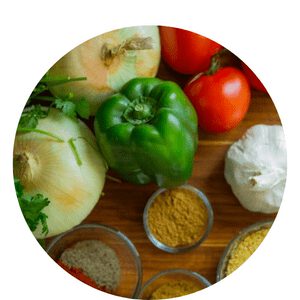
Chapter 1
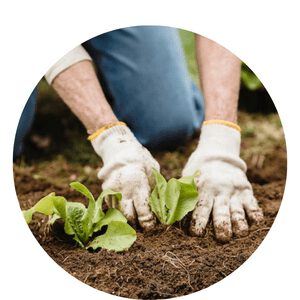
Chapter 2
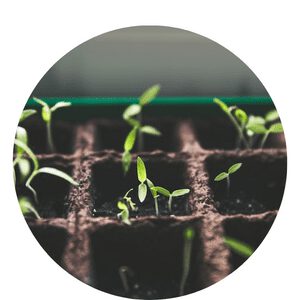
Chapter 3
Helps Us Grow – Share If You Like











